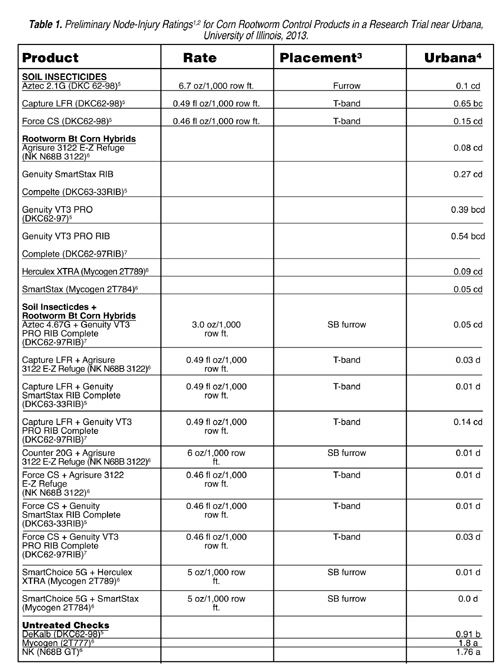Preliminary Root Ratings Posted For Corn Rootworm Products In Urbana, Illinois Trial
Dr. Michael Gray
Urbana, ILL.
Each year, the performance of corn rootworm products (Bt hybrids and
planting-time soil insecticides) are evaluated in several trials at
University of Illinois Education and Research Centers located near
DeKalb, Monmouth, Perry, and Urbana. The experiments are conducted in
plots that were planted to a trap crop (late-planted corn, interplanted
with pumpkins) the previous year. A trap crop system is used to help
ensure greater levels of rootworm pressure from year to year. In 2013,
the level of root pruning in three of the locations, DeKalb, Monmouth,
and Perry, was insufficient to adequately evaluate the efficacy of the
products. Consequently, only the root ratings for Urbana are provided in
this Bulletin article. Later in the year, for those interested, root
ratings for all the trials will be published in the on-line onTarget
Report.
Root injury in the untreated checks for the Urbana location ranged
from 0.91 (nearly 1 node of roots destroyed) to 1.8 (nearly 2 nodes of
roots destroyed). The DeKalb (DKC62-98) check had significantly less
root pruning than the other two checks; however, the seed had been
treated with a greater rate of an insecticidal seed treatment (Poncho
500). This difference in insecticidal seed treatment rates may have been
responsible for these root injury differences among the untreated
checks. In general, the insecticides and Bt hybrids provided high levels
of protection against rootworm larval injury in the Urbana study. The
application of Aztec 2.1G or Force CS to a Bt hybrid did not
significantly improve root protection over that of the soil insecticides
alone. Root injury was significantly less when Capture LFR was used in
combination with certain Bt hybrids (Agrisure 3122 E-Z Refuge and
Genuity SmartStax RIB Complete) as compared with its use as a
stand-alone rootworm product.
Producers are encouraged to consult the 2013 onTarget report that will
be published later this year for a full description of the insecticide
efficacy trials that were conducted across the state this past year.
This on-line report also provides results from our corn rootworm trials
from previous seasons. I offer my thanks to Ron Estes, Principal
Research Specialist, and Nick Tinsley, Research Specialist, Department
of Crop Sciences, for their leadership in the establishment of the corn
rootworm trials this past season. ∆
Dr. Michael Gray: Professor, University of Illinois

1Node-injury ratings are based on the 0-to-3 root-rating scale developed
by Oleson et al. (2005): 0.00 – no feeding damage; 1.0 – one node
(circle of roots), or the equivalent of an entire node, pruned back to
within approximately 1.5 inches of the stalk (or soil line if roots
originate above ground nodes); 2.0 – two complete nodes pruned; 3.0 –
three or more complete nodes pruned (greatest rating that can be given).
2Means followed by the same letter within a column do not differ significantly (P = 0.05, Duncan’s New Multiple Range Test.)
3Placement: T-band: insecticide applied in a 5-inch band over the
planted row; SB furrow: insecticide applied through a SmartBox
insecticide delivery system and directed into the seed furrow.
4Urbana – Planted on May 16, 2013 into an area planted to a trap crop in
2012 (late-planted corn interplanted with pumpkins). Roots were dug on
July 18, 2013.
5Seed treated with Poncho 500, 0.5 mg a.i. per seed.
6Seed treated with Cruiser 250, 0.25 mg a.i. per seed.
7Seed treated with Poncho 250, 0.25 mg a.i. per seed.